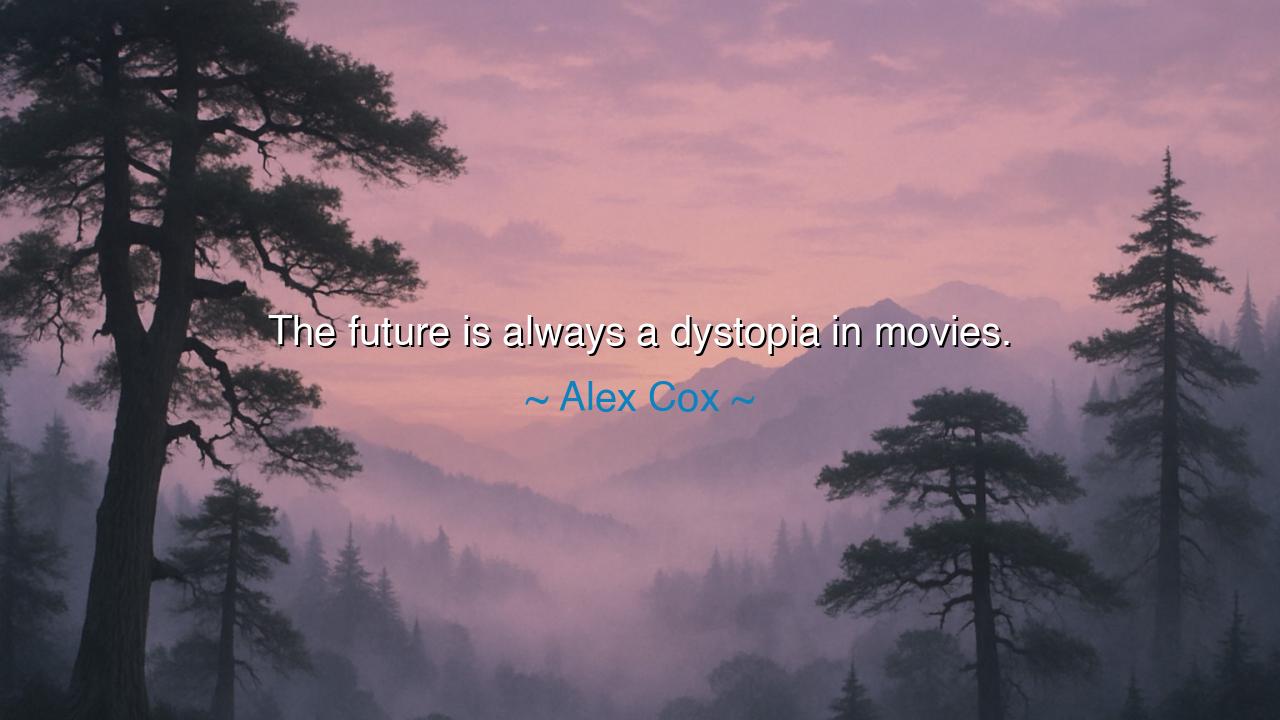
The future is always a dystopia in movies.






In the age-old storytelling traditions, the future was often portrayed as a time of uncertainty, a place where humankind could either find salvation or spiral into despair. Alex Cox’s words, “The future is always a dystopia in movies,” speak to an ancient truth—that humanity, when confronted with the unknown, often imagines the future not as a realm of hope, but as a mirror of its deepest fears. In movies, the future is not just a time ahead, but a reflection of what we believe may become of us if we continue on our current path. It is a cautionary tale that echoes through the ages, warning of the dangers of unchecked ambition, apathy, and corruption.
From the earliest days of storytelling, the future was portrayed with a sense of mystery and potential. The oracle of Delphi, in ancient Greece, foretold of a future that was both feared and desired—a future whose outcome was shaped by the actions of the present. However, as the centuries passed and humankind grew more powerful, the future began to take on a more ominous tone. The ancient myths, once filled with promises of divine intervention and enlightenment, began to darken. The gods themselves, once benevolent, began to mirror the flawed nature of humankind, and their intervention often led to ruin, symbolizing the inevitability of human error and destruction.
The idea of the future as a dystopia can be seen in the stories of the Fall of Rome, a once-great empire that rose to power, only to crumble under the weight of its own excesses and corruption. As Rome fell, its citizens believed they were witnessing the death of a glorious civilization, and the future they imagined was one of chaos, disorder, and collapse. This fear of a disastrous future has remained ingrained in our collective psyche, manifesting in countless tales of decline, from the Book of Revelation to the dystopian films of modern cinema. In each, we see a vision of humanity’s potential gone awry, where greed, mismanagement, and hubris lead to destruction.
In the world of cinema, the future is often depicted as a place where progress has spiraled into decay. Think of George Orwell’s "1984", where the future is ruled by an omnipotent government that monitors every action, stifling freedom in its wake. Or Ridley Scott’s "Blade Runner", where humanity’s thirst for immortality has led to the creation of artificial beings, enslaved in a world of bleak urban landscapes. These futures, though distinct in their settings, share a common thread: they warn us of the dangers of our own creations, our own desires, and our own weaknesses. The dystopian future is a reflection of our own flaws, exaggerated to show us what may happen if we do not change our ways.
This is the essence of Cox’s statement: dystopia in films serves as a mirror, showing us not only where we may end up, but also challenging us to change our course. It speaks to the heart of the human condition: we fear what we cannot control, and we fear what we have created in our image. As the great philosopher Plato once warned, "The price good men pay for indifference to public affairs is to be ruled by evil men." Movies about dystopian futures are not just warnings; they are calls to action, urging us to heed the lessons of the past and avoid repeating the same mistakes.
Yet, within these dark visions lies the potential for redemption. In the midst of the ruined cities and the oppressive regimes, there are always heroes—individuals who rise above the despair, who fight against the tide, and who seek to bring about change. This is where the wisdom of the ancients lies: while the future may often appear as a dystopia, it is through our actions in the present that we have the power to change the course of history. Hope is not passive, but active; it requires the courage to question, to rebel against injustice, and to pursue truth even when all seems lost.
The lesson, then, is this: the future is not set in stone. The dystopian futures portrayed in movies serve as both a warning and an opportunity for us to create a better world. We must recognize the dangers of complacency and pride and strive to make choices that lead to a future defined not by decay, but by growth, compassion, and wisdom. The power to shape the future lies within our hands, and we must act now to ensure that the future we create is not one of despair, but one of hope, justice, and prosperity for all.






AAdministratorAdministrator
Welcome, honored guests. Please leave a comment, we will respond soon